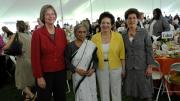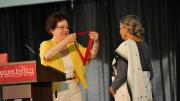“It is time we connected the dots” among labor unions, work, and peace, 2011 Radcliffe Medalist Ela Bhatt told luncheon guests at Radcliffe Day on May 27.
“Political freedom is only a shadow of economic freedom,” said Bhatt, a past member of India's parliament and the founder of the Self Employed Women's Association (SEWA), a labor union that represents 1.2 million women working in India's informal sector. “When you work, you have an incentive to maintain a stable society.”
The organization (whose acronym spells the Hindi word meaning to serve, departing Radcliffe Institute Dean Barbara Grosz noted in her introduction) was established in 1972. Although it is India’s largest union today, it is “still in the margins,” Bhatt said, maligned by trade unions because of its unusually holistic approach of providing not only advocacy for workers' rights, but also banking, healthcare, childcare assistance, a housing trust, and other services.
Bhatt, 77, recounted a few stories from SEWA’s history. When the group was first trying to register with the government, she recalled, they were asked against what the union was fighting. The explanation they gave: “We are not fighting against anyone. We are fighting for each other.”
Bhatt listed a few of the occupations of SEWA's members: “street vendors…agriculture workers, rug pickers, cart pullers.” From day one, these women challenged the notions of what qualifies as “work” and who counts as a worker, she said. Adversaries—the government and other labor unions—questioned whether informal laborers who often cobbled together a livelihood from multiple activities could be counted as workers per se. “We believe,” said Bhatt, “that work, like life, defies categories.”
She remembered how SEWA’s early members had struggled to get loans from banks. Some were illiterate, some had no last names, some lacked even a formal address. “Ask any slum-dweller,” she said. “Everyone knows who lives where. But the banks would have none of it.”
SEWA created its own bank, begun with deposits of 10 rupees each by 4,000 women in 1974, and that fund has since made loans totaling hundreds of thousands of rupees. The union now has sister organizations in South Africa, Afghanistan, Pakistan, and Nepal.
Voicing the driving question of this movement—“Who will represent the millions of home-based workers across the world” in places where SEWA or organizations like it do not yet exist—Bhatt noted that the Arab Spring uprisings were touched off when a Tunisian street vendor set himself on fire to draw attention to his plight.
The Radcliffe Medal honors those whose life and work have had a significant impact on society. In introducing Bhatt, Grosz noted that the Indian activist has said, "The definition of leader in SEWA is one who helps make others lead.” Bhatt’s remarks returned to this theme of leading by lifting others up. “Change comes from within. It cannot be imposed,” she said. “Eventually, we believe, it is the margins that define the center.”
Despite SEWA’s support for women’s empowerment, the organization does not take a position on purdah, the Islamic requirement that women conceal themselves from men through covering their bodies and physical segregation. “When women have the support of other women, and when they have income of their own,” Bhatt said, “they are able to fight their own battles in their own way.”
The luncheon's organizers described Bhatt as a “gentle revolutionary,” and indeed, she spoke of a quiet yet persistent strength particular to women: “Once a woman knows what she wants,” Bhatt said, “she’s not afraid to take risks. If we cannot break through, we just find a way around.”











